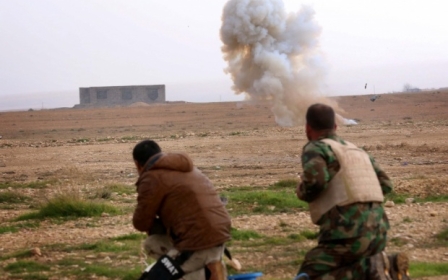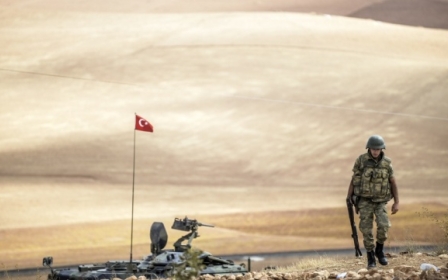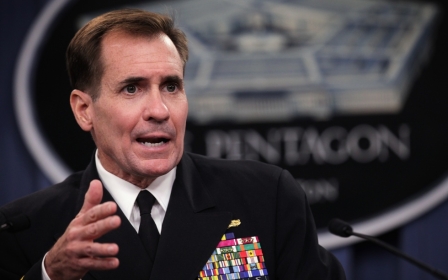Erdogan says peace process with Kurds cannot continue amid attacks

Turkish President Recep Tayyip Erdogan said on Tuesday that Ankara could not continue the peace process with the Kurds amid continuing attacks against Turkish targets.
Hours after Erdogan's speech, Turkish military sources told Sky Arabia the outlawed Kurdistan Workers' Party (PKK) had abducted a police officer in the mainly Kurdish south-eastern city of Diyarbakir on Tuesday evening.
"It is not possible to carry on the (peace) process with those who target our national unity and brotherhood," he said, referring to the PKK.
Turkey, which considers the PKK a terrorist organisation, launched peace negotiations with the group's jailed leader Abdullah Ocalan in late 2012, but the two sides have yet to reach an accord.
Ankara has expanded the cross-border campaign against the Islamic State (IS) in Syria, beginning last week to include PKK positions in northern Iraq, after deadly attacks inside Turkey blamed on the Kurdish separatists.
On Tuesday, Turkish jets Kurdish militant positions in southeastern Turkey after the group fired on security forces, Turkish army sources told AFP.
"Two F-16 jets carried out air strikes at 1510 local time (1210 GMT) against the terrorist group" in a mountainous region bordering Iraq, the army said in a statement, referring to the outlawed Kurdistan Workers' Party (PKK).
Military sources also reported that an army sergeant was shot dead by a member of the PKK near the Turkey-Iraq border. It was not immediately clear whether the PKK had taken responsibility or publicly commented on the shooting.
Tuesday's shooting is one of several attacks on Turkish security personnel over the past week since a suicide bombing attack in Suruc killed 32 and injured 100.
On Monday, gunmen in a predominantly Kurdish part of eastern Turkey shot a paramilitary police commander dead. Last week, the PKK took responsibility for fatal shooting of two police officers in Ceylanpinar, near the Syrian border.
"Those who exploit the people's and the state's tolerance and patience will receive the answer they deserve as soon as possible," Erdogan said in his speech on Tuesday.
Erdogan vowed that Turkey's operations against Kurdish militants and IS would continue "with determination".
"Any step back is out of the question. This is a process and this process will continue with the same determination," he told reporters at an Ankara airport before leaving for China on an official visit.
He also voiced hope that NATO, which is holding an emergency meeting on Tuesday, would take necessary steps.
"Turkey will use whatever rights stemming from international law till the very end" to protect itself from attacks, he added.
NATO in 'strong solidarity' with Turkey
"NATO is following developments very closely and we stand in strong solidarity with our ally Turkey," Stoltenberg said at the opening of the emergency meeting of all 28 member states requested by Ankara.
"Terrorism in all its forms can never be tolerated or justified. It is right and timely that we hold this meeting today to address the instability on Turkey's doorstep and on NATO's border," Stoltenberg said.
Turkey, the alliance's only Muslim member and one of its most powerful, called for the meeting after a bloody attack it blamed on "terrorists" in the southern town of Suruc last week.
Stoltenberg made no comment about Turkey's decision to launch strikes against IS fighters and Kurdish militants in Syria, in effect combining its campaigns against the Kurds and IS into a broad "war on terror" even though the two groups are themselves bitterly opposed.
The move has raised doubts over whether Turkey is more interested in limiting Kurdish capabilities in Syria and Iraq than in tackling IS.
Stoltenberg told the BBC on Sunday that "self-defence has to be proportionate" and it was expected that at Tuesday's meeting, Turkey will face close questioning over the apparent change in strategy.
NATO allies, led by the United States, have up to now seen Kurdish groups in Syria and Iraq as one of the most effective military options against IS.
Middle East Eye propose une couverture et une analyse indépendantes et incomparables du Moyen-Orient, de l’Afrique du Nord et d’autres régions du monde. Pour en savoir plus sur la reprise de ce contenu et les frais qui s’appliquent, veuillez remplir ce formulaire [en anglais]. Pour en savoir plus sur MEE, cliquez ici [en anglais].




